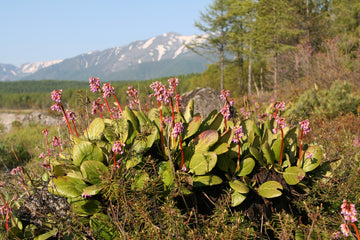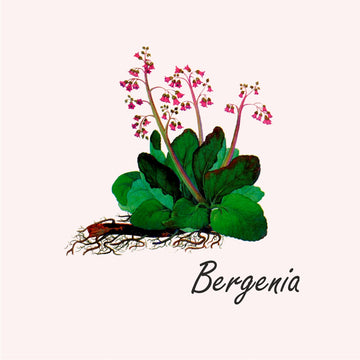Bergenia is a beautiful pink flower native to central Asia. It grows as far east as Afghanistan and as far west as China, including the Himalayan region and of course Lake Baikal. The herb was named after the prominent German botanist and physician Karl August von Bergen. The plant also goes by the name “Elephant’s ears” because of the shape of its leaves, and also “pigsqueak” due to the noise made by the leaves when you rub them together.
Our Chaga & Bergenia tea is now on sale, order today and stay healthy:
https://baikaltea.com/collections/frontpage/products/chaga-tea-with-bergenia-organic
Bergenia has a history of medicinal use in India, Nepal and China, to treat everything from coughing to pulmonary disease. It has also been used to stop bleeding, strengthen immunity and dissolve kidney stones. Bergenia is rich in polyphenols, including the compound Bergenin. Bergenin has been shown to promote a strong immunomodulatory effect.
There are medicinal elements to be found all throughout the Bergenia plant. For instance, the rhizomes of the plant have been used for centuries in Ayurvedic medicine to dissolve kidney stones. The rhizomes can also be crushed up and used to treat chronic ulcers. The leaves of the plant can be used to treat cough and cold, and they are best prepared as an herbal tea with warm or hot water. The tea is slightly astringent, with great cooling properties that can be soothing to the body.
Bergenia is also known as Siberian tea, because of its popularity in Russia and central Asia. Because Bergenia does not contain any caffeine, it can be consumed as an herbal tea right before bed. The soothing and calming properties make it the perfect tea to enjoy after dinner, particularly if you experience indigestion. It can also be taken alongside Chaga, another caffeine free tea. Chaga is another herbal tea that has a long history of medicinal use. Chaga has been shown to provide a cognitive improvement in animal trials and it also has shown a potential for immune-system enhancing effects.
It is important to have a strong immune system in order for your body to be able to fight off infection, viruses and bacteria. It is also important that your immune system is not overactive, or it may attack the healthy cells in your body. This stresses the importance of immunomodulators. Immunomudulators can strengthen the immune system without making it overactive. Chaga and Bergenia both can have immunomodulatory effects, so taking them together can be a great way to improve your immune system. Luckily for us, Chaga and Bergenia actually combine quite well into an herbal tea. There is a nice earthiness from the Chaga, and a refreshing astringency from the Bergenia. This is a perfect warm drink to enjoy in the middle of winter flu season.
--
Adding just a tiny bit of Bergenia to Chaga is an ancient Siberian recipe shared with us by the indigenous people of these lands. Bergenia opens up Chaga in flavor and nutrients. Both Chaga and Bergenia are considered immunomodulators, meaning they take care of our immune without making it overreactive.
Would like to try it yourself?
Our Chaga & Bergenia tea is now on sale, order today and stay healthy:
https://baikaltea.com/collections/frontpage/products/chaga-tea-with-bergenia-organic


